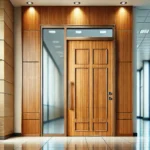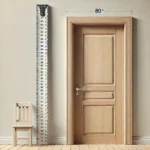Sliding doors have become a popular choice in modern architecture and interior design due to their sleek design, functionality, and versatility. These doors not only enhance the aesthetic appeal of a space but also provide practical solutions for maximizing room usage and ensuring seamless transitions between indoor and outdoor areas. From homes and offices to commercial spaces, sliding doors offer a range of benefits that make them a preferred option for various settings.
What Is a Sliding Door?
A sliding door is a type of door that operates by moving horizontally along a track, rather than swinging open like traditional hinged doors. This mechanism allows the door to slide smoothly and efficiently, making it an excellent choice for areas where space is limited or where a streamlined look is desired. Sliding doors are typically made from materials such as glass, wood, aluminum, or a combination of these, allowing for a variety of styles and finishes to suit different design preferences.
Benefits of Sliding Doors
One of the primary advantages of sliding doors is their ability to save space. Since they do not require the additional room needed for swinging doors, sliding doors are ideal for smaller areas or spaces with a compact layout. This feature is especially useful in apartments, offices, or rooms where maximizing available space is crucial.
Sliding doors also enhance the flow of natural light. When made of glass, they allow sunlight to enter, creating a bright and welcoming atmosphere. This feature is particularly beneficial for connecting indoor and outdoor spaces, as sliding glass doors provide a clear view of the surroundings while maintaining a barrier against weather and noise.
Another significant benefit of sliding doors is their ability to improve accessibility. With a smooth sliding mechanism, these doors are easy to operate, making them a practical choice for people of all ages, including children and elderly individuals. Sliding doors can also be customized with wider panels to accommodate wheelchair access, ensuring inclusivity and convenience.
Types of Sliding Doors
Sliding doors come in various types, each designed to serve specific purposes and suit different styles. One common type is the standard sliding door, which consists of two panels, one of which slides over the other. This design is often used in residential settings, such as patios, balconies, or room dividers.
Another popular option is pocket sliding doors. These doors slide into a compartment within the wall, disappearing entirely when open. Pocket sliding doors are ideal for spaces where a clean and minimalist look is desired, as they eliminate visible tracks and save even more space.
Bi-fold sliding doors are another variation, consisting of multiple panels that fold and stack against each other when opened. These doors are commonly used in commercial settings, such as restaurants or conference rooms, as they provide a wide opening and a seamless connection between spaces.
Applications of Sliding Doors
Sliding doors are highly versatile and can be used in a variety of settings. In residential properties, they are often installed as patio doors, providing a smooth transition between indoor living areas and outdoor spaces. They are also popular as wardrobe doors, offering a sleek and modern solution for bedroom storage.
In offices, sliding doors are frequently used for conference rooms or private cabins, creating a professional and contemporary appearance. Their ability to reduce noise and maintain privacy makes them a practical choice for workplace environments.
In commercial spaces, such as retail stores and restaurants, sliding doors enhance accessibility and customer experience. Automatic sliding doors, commonly found at entrances, offer a hands-free and welcoming entry point for visitors. Additionally, sliding doors can be used as movable partitions, allowing for flexible space management and customization.
Material Options for Sliding Doors
The material used for sliding doors plays a significant role in their functionality, durability, and aesthetic appeal. Glass is a popular choice due to its ability to allow natural light and provide an open and airy feel. Frosted or tinted glass options are available for added privacy without compromising style.
Wooden sliding doors offer a warm and traditional look, making them suitable for rustic or classic interior designs. They can be customized with various finishes and stains to match the overall décor. Aluminum sliding doors are lightweight and durable, often chosen for modern or industrial-style spaces. Their sleek frames and corrosion resistance make them a practical choice for outdoor applications.
Maintenance and Care
Proper maintenance is essential to ensure the longevity and smooth operation of sliding doors. Regular cleaning of the tracks and rollers prevents debris from hindering the sliding mechanism. Lubricating the tracks with a suitable oil or silicone spray can help maintain effortless movement.
Glass panels should be cleaned with a non-abrasive glass cleaner to keep them free from smudges and stains. Wooden doors may require occasional polishing or sealing to protect them from moisture and wear. Inspecting the door’s hardware, such as handles and locks, ensures that they remain functional and secure.
Innovations in Sliding Door Design
Advancements in technology and design have led to innovative sliding door solutions that cater to modern needs. Smart sliding doors equipped with sensors and remote control features provide convenience and enhanced security. These doors can be programmed to open and close automatically, making them ideal for high-traffic areas or homes with advanced automation systems.
Energy-efficient sliding doors with insulated glass panels help regulate indoor temperatures and reduce energy consumption. This feature is particularly important for maintaining comfort and sustainability in both residential and commercial spaces.
Acoustic sliding doors are another innovation, designed to reduce noise transmission and create a quieter environment. These doors are commonly used in offices, hotels, and recording studios, where sound control is essential.
Conclusion
Sliding doors are a versatile and stylish solution for various architectural and interior design needs. Their ability to save space, enhance natural light, and improve accessibility makes them a valuable addition to any setting. Whether used in homes, offices, or commercial spaces, sliding doors offer a blend of functionality and aesthetics that cater to modern lifestyles.
With a wide range of materials, styles, and advanced features available, sliding doors can be customized to meet specific requirements and design preferences. Proper maintenance and care ensure their longevity and continued performance. As innovations in sliding door technology continue to evolve, these doors remain a timeless and practical choice for creating dynamic and visually appealing spaces.
![]()





